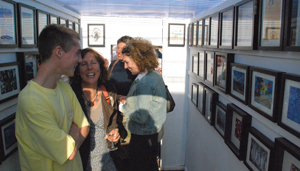Floating the boat
In the choppy waters of NHS reforms and government cuts, much is changing in the area of arts, health and wellbeing. Victoria Hume reports

At the end of April, the Treasury sent a warning to all government departments advising them to hang on to a 5% reserve in their budgets. The message was clear: no new money. Former Chancellor Alistair Darling recently likened the financial crisis to a cyclone – in the quiet of the eye of the storm, it is easy to forget that there is more to come. The past few years have involved rapid learning for all of us, as we try to understand the implications of rapid disinvestment in the whole of the public sector. And, for arts professionals working in ways that rub up against the health and social care sectors, there is the added complication of getting our heads, and those of our organisations, around massive changes.
As we examine these changes – the abolition of Primary Care Trusts, the establishment of health and wellbeing boards, the transfer of responsibility for public health to local authorities, and so on – the temptation is to throw our hands in the air and run from the room screaming. Thankfully most of us, most of the time, don’t do that. But there is a clear and growing need for tools to help us understand the impact of these changes, and for a clear voice of advocacy to the new bodies and structures which now make up the NHS.
Over the past six months, a series of events across the country have sought to steady the vision of those of us working in this field, asking: Why do we do what we do? What role should the arts play in health and wellbeing? And how can we persuade others of the value of this work? The heartfelt, practical and incisive responses drawn from these events are now being shaped into a new charter for arts and health. We hope this charter will be a calling card for those working in the field, a flag behind which all those who believe in the transformative power of the arts can rally. But also, crucially, it will act as a mission statement for the new National Alliance for Arts, Health and Wellbeing.
The National Alliance brings together nine regional organisations from across England, all of whom have recognised the need for a national voice to make the case for the arts in health, and for a national hub for information and debate. It will liaise with other national bodies with shared interests – the voluntary arts, arts therapies, academia, public art, arts in criminal justice and more – to bang the drum for the impact that participation in the arts can have on the lives of individuals, communities and society as a whole. We must encourage the commissioning of new arts opportunities, but potential commissioners first need to see this work and understand the effect it can have; the regions are therefore working together to create new showcases.
London Arts in Health Forum is running the first London Creativity and Wellbeing Week this June, to shine a light on the huge variety of ways in which the arts help and improve the health of Londoners. From choirs which support people with dementia to groundbreaking hospital design incorporating the work of leading artists, there is a huge range of work happening in the capital alone. Arts in health work is often seen, and reported, as an isolated event, but the week will pull together more than 50 debates and discussions, performances and exhibitions, tours and practical sessions into a festival of ideas; with a wealth of opportunities to find out about the ways in which the arts and culture impact on health and wellbeing.
Next summer, Arts and Health South West will be holding a major international conference in Bristol, on behalf of the National Alliance. The conference will be an opportunity to learn about the latest research and new methodologies from across the world. Alongside practical workshops and performances, there will be discussions and analysis of policy developments. There will be particular focus areas, including the arts in healthcare settings and the role of museums in health. Most of all it will be an opportunity to showcase the best of UK arts in health practice to the rest of the world.
There are other developments, too. The Baring Foundation is funding the development of a website dedicated to supporting arts organisations working with older people. Lankelly Chase Foundation is funding an investigation of the barriers to commissioning arts in health activities. And a new arts in health research network is pushing the boundaries of how we evaluate our impact.
There is power in working together and we hope the National Alliance will help the flotilla of small arts organisations working in and around the NHS to navigate the storm ahead.
Join the Discussion
You must be logged in to post a comment.